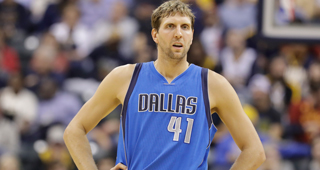There’s a moment in the serialized documentary that Grantland ran in 2014, The Finish Line, on Steve Nash’s last professional season, where Nash and Dirk Nowitzki are ostensibly having dinner but nobody has food in front of them and the white tablecloth is lit like a full moon and the two old and aging friends are lazily batting around hypotheticals and failing to lose themselves in front of the camera. The only truth that dribbles out does so when Nash asks Dirk if he would retire if he were in Nash’s shoes, which is to say constantly banged up, more or less completely cooked as a player and unable to stay on the court for any extended period of time. Dirk waffles and strokes his face. He’s trying not to be mean, but the answer is basically no. He wouldn’t want to endure grinding rehab stints only to return for a short stretch, tweak something, and be out for another month. He’d hang it up instead.
Nash was forty when he was talking to Dirk, two games away from retirement, though he only sort of knew it at the time. Dirk is 39 and entering his twentieth year in the league. His decline has not been nearly as sudden or unsatisfying as Nash’s, but he picked up his first major injury last season—a bum achilles that kept him out of 24 of the Mavericks’ first 29 games—since recovery from a knee surgery sidelined him until Christmas in 2012. Once Dirk got back in the lineup, he put up 14 and six, because he could play in one of those walking scooters Kevin Durant had to use after doctors put a screw in his foot and still get a few buckets, but Dirk is evidently right at the end of his career. Each successive year, he’s slower and creakier than before, and he’ll do his best to avoid one of those final seasons where he plays thirty games and shoots thirty-something percent. At most, he has two years left.
It hasn’t gotten sad for Dirk yet and here’s hoping it never does, but there are questions to be asked about why he’s still kicking around. The Mavs made little effort to improve over the summer and they plan to run more this season, which doesn’t suit the wooden seven-footer. It would be a surprise if they compete for a playoff spot; the roster simply isn’t all that good. Harrison Barnes is nobody’s hero. Wes Matthews is a gamble that didn’t pay off. Dennis Smith Jr. figures to be exciting but very few rookies actively help their teams win games. Rick Carlisle is a great coach, and like all great coaches, he’s pretty miserable even when his squad is playing well. In the middle of a thirty-win season, being around him must be like piloting a deep sea craft down to the level of the ocean that’s all ink-dark emptiness and bioluminescent worms.
Yet Dirk didn’t seem to have any qualms about returning. He signed a cut-rate deal over the offseason—Mark Cuban has to be throwing him an ownership cut after he retires—and didn’t suffer through the Hamlet-esque period of indecision like a lot of stars do toward the conclusion of their playing days. There’s an admirably grateful, matter-of-fact love of the game at work there, a sense that of course he’s going to play if he’s physically able. Why would I retire unless I absolutely had to? But there is also inertia. You do one thing for long enough—especially one that you’re aware you’ll be unable to do sooner rather than later—and what makes the most sense to you is to keep doing it until you’re forced to change course.
I’m a Trenton Hassell-level writer, but even I often find myself writing well after the point in the day when I’ve told myself I’m going to stop, not because I have so many ideas that I need to write twelve hours per day to get them all down, but because it’s a habit around which I’ve built the rest of my life. If I’m writing, I exist. If I’m doing anything else, I’m not so sure.
Not that you can absentmindedly keep up an NBA career, but routines—especially strenuous, life-consuming ones—can be hard to break. We get addicted to the process without thinking about the outcome or the broader point of it all. Professional athletes are supposed to be the most competitive among us, and they purportedly play to win, but they also play just to play, and to be comforted by the familiar mechanics of playing. Many retired athletes, when they’re asked what they miss about the game, seem overwhelmed by the question because they miss the totality of the experience: the locker room camaraderie, the steady churn of regular season games, the playoff scraps, and the slow and grinding process of getting better. It’s not that all of this is fun, but it is something to occupy yourself with, and because it’s so difficult, you’re occupied with it almost all of the time. Once you’re done with all that, there’s suddenly a lot of quiet to fill up with noise again.
So sure, Dirk Nowitzki’s giving it another season. Maybe two, if he’s still feeling good next June. As long as it’s not a complete slog and as long as he can do it, he won’t willingly give up a part of himself he knows he’ll never get back.
More Futures: Atlanta Hawks, Boston Celtics, Brooklyn Nets, Charlotte Hornets, Chicago Bulls, Cleveland Cavaliers, Denver Nuggets, Detroit Pistons, Golden State Warriors, Houston Rockets, Indiana Pacers, Los Angeles Clippers, Los Angeles Lakers, Memphis Grizzlies, Miami Heat, Milwaukee Bucks, Minnesota Timberwolves, New Orleans Pelicans, New York Knicks, Oklahoma City Thunder, Orlando Magic, Philadelphia 76ers, Phoenix Suns, Portland Trail Blazers, Sacramento Kings, San Antonio Spurs, Toronto Raptors, Utah Jazz, Washington Wizards



